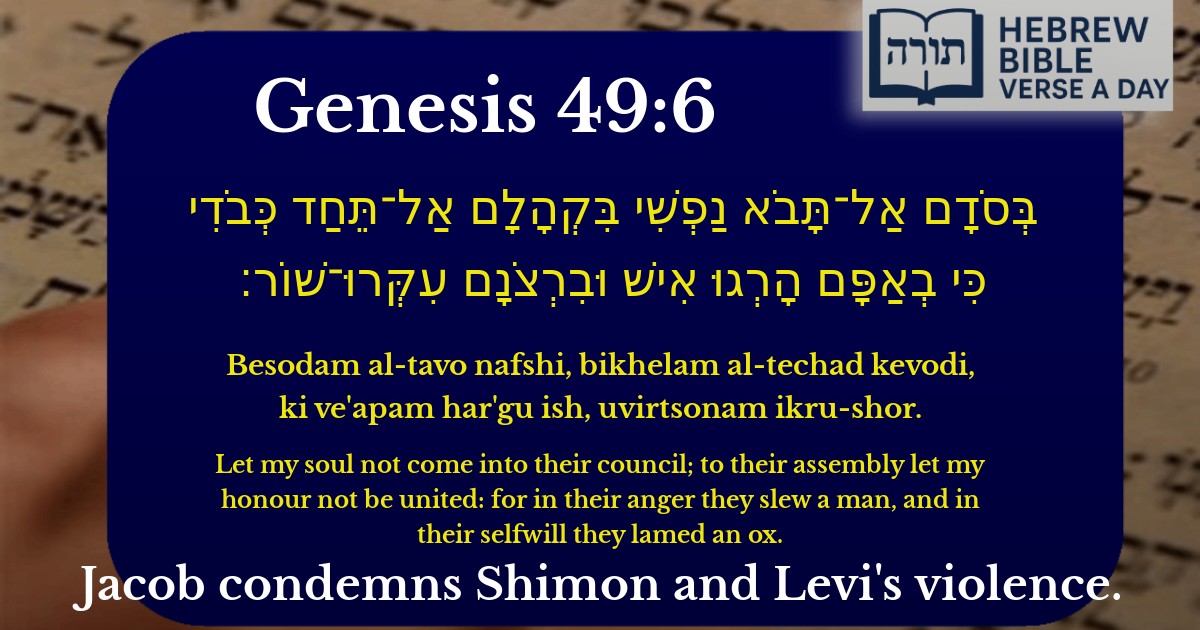Frequently Asked Questions
Q: What does Genesis 49:6 mean?
A: In Genesis 49:6, Jacob is blessing his sons on his deathbed and refers to the violent actions of Shimon and Levi (his sons) in Shechem (Genesis 34). The verse expresses Jacob's disapproval of their anger and cruelty—'for in their anger they slew a man, and in their self-will they lamed an ox.' Rashi explains that Jacob is distancing himself from their behavior, saying his soul should not join their council or their violent ways.
Q: Why is Genesis 49:6 important?
A: This verse is important because it teaches the Torah's strong disapproval of unnecessary violence and acting out of anger. Jacob, as a righteous patriarch, condemns his sons' actions to emphasize that even justified anger must be controlled. The Rambam (Hilchot De'ot 2:3) teaches that extreme emotions like uncontrolled anger are morally destructive, and this verse reinforces that principle.
Q: What can we learn from Genesis 49:6 today?
A: We learn that acting impulsively in anger leads to sin and regret. Jacob’s words remind us to avoid joining groups or making decisions based on rage or cruelty. The Talmud (Nedarim 22a) warns that anger can lead a person to foolish actions, and this verse serves as a timeless lesson about self-control and ethical behavior.
Q: Who is Jacob referring to in Genesis 49:6?
A: Jacob is referring to his sons Shimon and Levi, who took revenge on the city of Shechem (Genesis 34) after the prince of Shechem wronged their sister Dinah. Though their anger had a cause, Jacob criticizes their excessive violence. The Midrash (Bereshit Rabbah 99:6) explains that their zeal was misplaced, and Jacob rebukes them to teach future generations proper conduct.
Q: How does Genesis 49:6 apply to conflicts today?
A: This verse teaches that even when we feel wronged, we must respond with justice, not uncontrolled vengeance. Jewish law (based on sources like Rambam’s Mishneh Torah) requires fair judgment, not vigilante violence. The verse reminds us that joining harmful groups or acting out of anger—even for a 'good cause'—can lead to moral failure.


Context and Source
The verse (Bereshit 49:6) is part of Yaakov Avinu's blessings to his sons before his passing. Here, Yaakov addresses Shimon and Levi, rebuking them for their violent actions in Shechem (Bereshit 34:25-29). The verse expresses Yaakov's rejection of their impulsive anger and cruelty.
Literal Interpretation (Peshat)
Rashi explains that Yaakov is distancing himself from Shimon and Levi's violent tendencies. The phrase "בְּסֹדָם אַל־תָּבֹא נַפְשִׁי" ("Let my soul not come into their council") refers to their conspiracy in Shechem, where they deceitfully convinced the men to circumcise themselves before attacking them. "בִּקְהָלָם אַל־תֵּחַד כְּבֹדִי" ("to their assembly let my honour not be united") indicates that Yaakov does not want his name associated with their violent gathering.
Moral and Ethical Lessons (Derash)
Rambam (Hilchot De'ot 2:3) emphasizes the importance of controlling anger, and this verse serves as a warning against acting impulsively in rage. The Midrash (Bereshit Rabbah 98:5) elaborates that Yaakov foresaw the future consequences of their actions—Shimon and Levi's descendants would be scattered (as seen in the distribution of the Levites and the dispersion of Shimon's tribe).
Halachic Implications
The Talmud (Sanhedrin 82a) discusses the limits of zealotry, using this episode as a cautionary example. While Pinchas was praised for his zeal (Bamidbar 25:7-13), Shimon and Levi were rebuked because they acted without proper authority (Ramban). This teaches that even justified anger must be tempered with wisdom and halachic guidance.